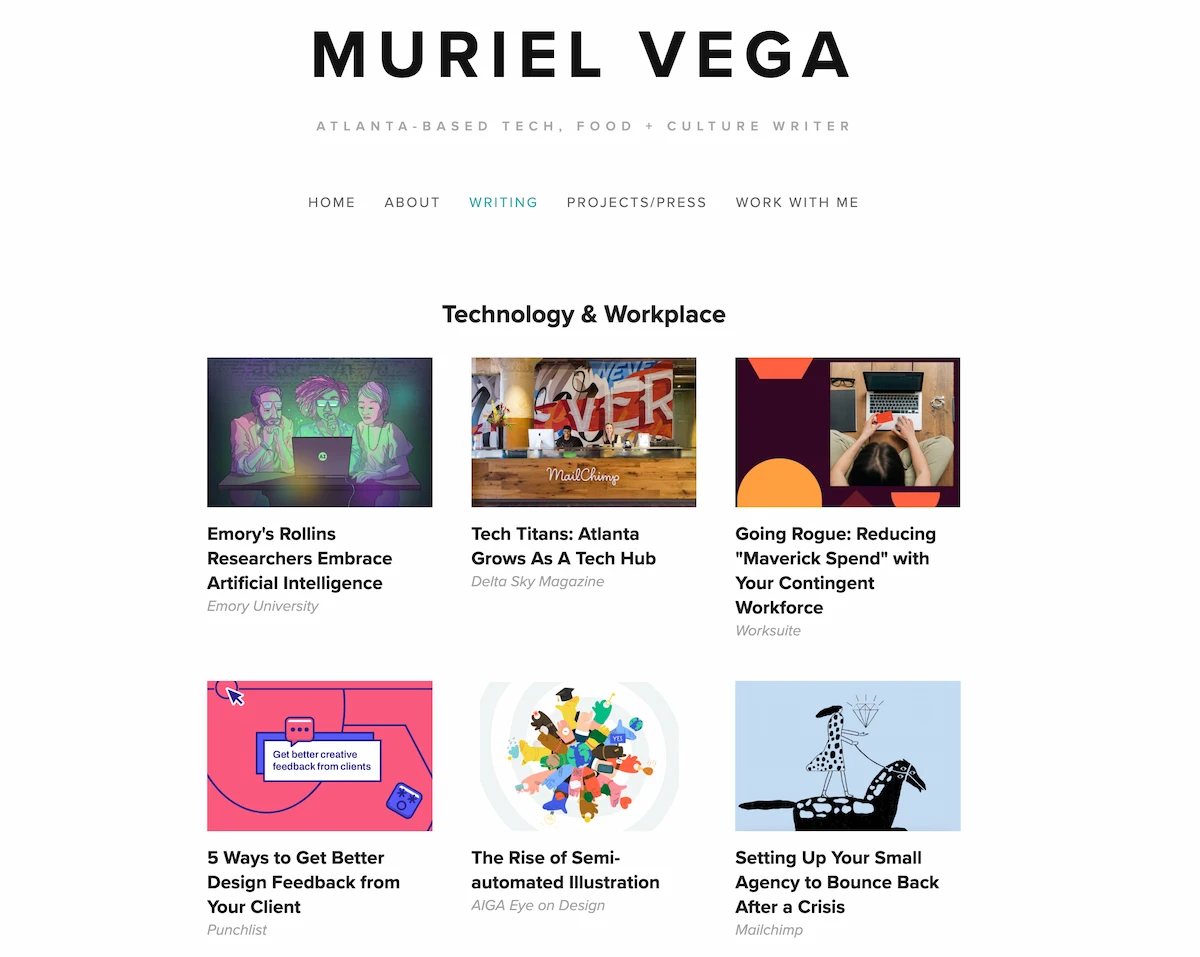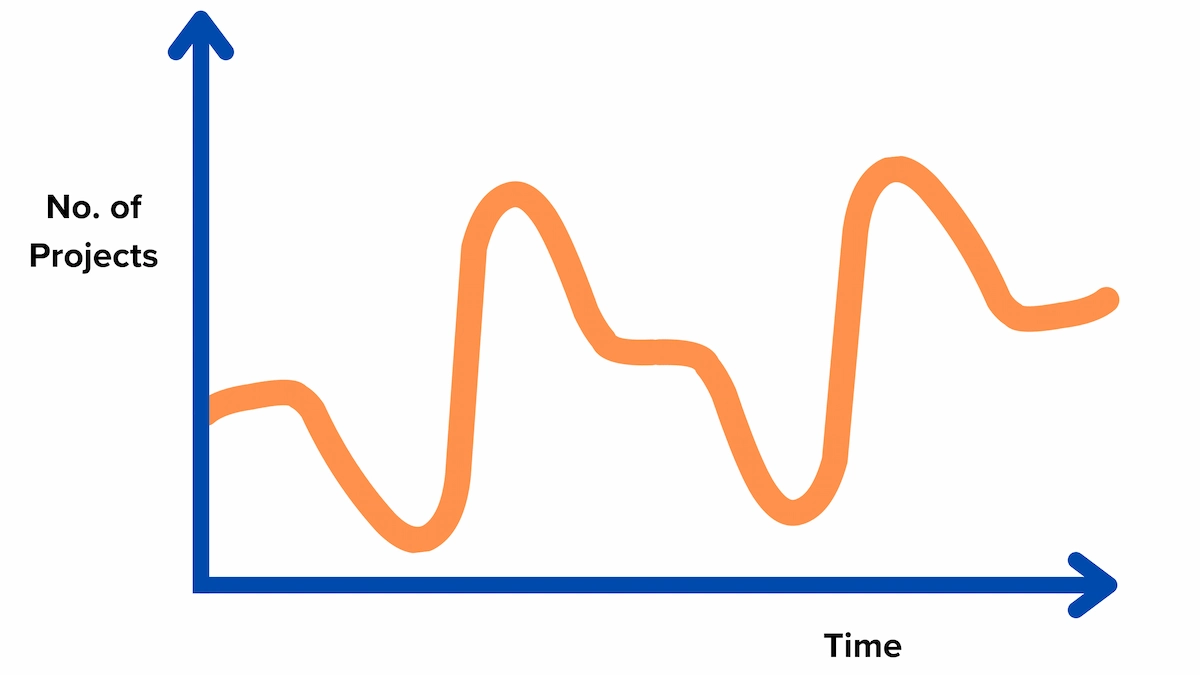Freelancing and employment both have their pros and cons. Having been faced with the choice myself in the past, I know it can be difficult to choose the right path for your career. Or, as is perhaps more common, to understand if it’s time to make the switch.
Freelancing can be a great opportunity for those who want to work on their own schedule and be their own boss. But it’s not that simple.
Below, I go into more detail about the pros and cons of each type of employment. I’ll use my own experience after 5+ years as a freelancer to help you understand whether it’s the right choice for you.
Pros & Cons Of Freelancing
First, let’s talk about the pros and cons of freelancing as a career. Some of these might be obvious if you’ve been considering it for a while.
But there are some important questions to ask yourself before you jump in—no matter how good it might sound at first.
Pros Of Freelancing
1. Flexibility
One of the biggest advantages of freelancing is the flexibility it offers. You can work from anywhere (if you’re a digital freelancer that is) and you can choose your own work hours. This lets you balance your personal and professional life more effectively.
It’s easier than ever to work remotely and collaborate with clients without being physically present, thanks to collaboration tools and project management systems (and email, of course). This makes freelancing a very flexible form of employment.
2. Increased Earning Potential
Freelancers often have a higher earning potential than employees. As an independent contractor, you can set your own rates and negotiate higher pay for your skills and time. Plus, you can take on multiple projects simultaneously, increasing your overall income, rather than being stuck working one single job.
However, clearly your earnings can vary a lot and depend on many different factors, and I’ll discuss them more soon.
Note: Don’t just choose to become a freelancer for the higher earning potential, because it’s the benefit you’re likely to see later than all the others.
Why?
Because it takes time to build your skills and reputation to the point where you can actually start charging high rates.
3. Diverse Workload
As a freelancer, you have the chance to work on a wide range of projects, rather than being tied to a day-to-day workload. This can keep your work interesting and challenging.
You have more control over the type of work you choose, and you can take on projects that align with your passions and interests.
Getting those roles is another matter, of course. But as you progress, you might find these projects start coming to you, rather than the other way around.
4. Ability To Build Your Brand
As a freelancer, you have the opportunity to build your personal brand and promote your services. You can create a portfolio of past projects and showcase your expertise in your field, which can attract new clients and increase your visibility.

This isn’t typically something you consider with traditional employment.
5. Independence
As a freelancer, you are your own boss (to an extent). You have the freedom to make decisions about the kind of work you take on, the clients you work with, and how much you charge. You might find this autonomy to be empowering and give you more control over your career path.
However:
You’ll still have to answer to clients, so you’re not fully in control.
You could see this as a disadvantage of freelancing, but what are some other cons to consider?
Cons Of Freelancing
1. Income Instability
Your earnings as a freelancer can be unpredictable and subject to fluctuations, leaving many to wonder if freelancing is a safe career. There may be times when you have multiple projects and other times when you have none at all.

It can also be hard to track your income and manage your finances as a freelancer as a result of having lots of different projects on the go at one time. There’s no employer to calculate your tax for you—it’s all on you.
Your income will depend on your own abilities of course, but also how well you market yourself and how you can deal with clients. You need to get comfortable selling yourself, and working with potentially difficult clients.
2. Lack Of Benefits
Freelancers typically do not receive benefits such as health insurance, paid time off, or retirement plans. You are responsible for providing these benefits for yourself.
Clearly whether you’re able to cover these things will also depend on how much you earn.
3. Self-Discipline
Freelancing requires self-discipline and motivation to stay productive and on top of deadlines. You must be able to manage your time effectively and avoid distractions if you want to be successful.
Further reading: 10 Tips To Be More Productive As A Freelancer
4. Limited Social Interaction
Freelancers often work alone, which can lead to feelings of loneliness and isolation. You’ll see lots of articles telling you to maintain a social network etc. But for many freelancers, this just isn’t all that easy to do, especially in the beginning.
But I will say I’ve found this to get easier over time. You’ll start getting more interactions on LinkedIn, along with calls with clients. And this can all help it feel a bit less lonely.
And of course, interacting with family and friends outside of your work is key. But you don’t need me to tell you that!
5. Responsibility For Your Own Growth
Finally, as a freelancer, you are responsible for your own growth and development. You need to stay up to date with industry trends, develop new skills, and market your services effectively to stay competitive.
There are no bosses to promote you based on your performance—you have to actively look for opportunities for new projects (and higher earnings).
This can be a challenging and time-consuming process, and you won’t get any formal job training that you don’t pay for yourself.
Further reading: How To Learn Freelancing (All The Best Ways)
Pros & Cons Of A Full-Time Job
Pros Of A Full-Time Job
1. Steady Income
One of the biggest advantages of a full-time job over freelancing is the steady income it provides. With a full-time job, you have a regular paycheck, which makes it easier to plan your finances and budget accordingly.
Unlike freelancing where the income can be unpredictable, with a full-time job, you know exactly what you’re going to earn. This provides a sense of stability and security, one that can, for many, outweigh the potential earnings increase you can get as a freelancer.
I’ve personally had a few months where the instability of freelancing has made me consider jumping ship to employment. But, provided you have the skills and mindset (and ideally a safety net of savings to fall back on if need be), you’ll be able to get through these drought periods.
2. Benefits
Full-time employees are usually entitled to benefits like health insurance, paid time off, and pension plans. These benefits can provide a lot of security beyond your monthly income.
Full-time employees may also have access to other benefits such as training programs and career development opportunities. This can help you advance your career at the expense of your employer (rather than paying for it yourself, like freelancers need to).
3. More Social Interaction
Full-time jobs offer more opportunities for social interaction than freelancing. Employees have colleagues to interact with, which creates a sense of community within the workplace. This can be important for maintaining your motivation and productivity, as well as reducing feelings of loneliness and isolation.
Not all freelancers will work totally alone though, and some freelancers may even work within larger companies as a contractor (I’ve personally enjoyed working as part of bigger teams as a freelance editor).
However, this won’t be the case for many and arguably most freelancers, so it’s important to consider if you’re thinking about making the leap to self-employment.
4. Work-Life Balance
While full-time employees may have less flexibility than freelancers when it comes to choosing their work hours, many companies are now recognizing the importance of a good work-life balance. Employers are offering more flexible work arrangements, such as remote work or flexible hours, which can help employees to balance their personal and professional lives.
Plus, the steady paycheck means you typically don’t need to do any work outside of your regular hours, except the odd bit of overtime (clearly this isn’t true of all jobs though).
Freelancers will often work longer hours, at least in the beginning, and a lot of the “work” is done for free. This includes things like learning new skills, marketing and promotional efforts, and perhaps building your website or emailing prospective clients.
Note: That’s why, as a freelancer, you need to factor in “non-work time” when choosing your rates.
Cons Of A Full-Time Job
1. Limited Autonomy
Full-time employees have less autonomy than freelancers when it comes to choosing the projects they work on or how they work. In many cases, you have to follow a set schedule and work on projects your employer assigns to you.
Obviously, as you progress, and in certain roles, you might have more flexibility here. But generally speaking, you won’t have as much as freelancers do.
2. Limited Earning Potential
As an employee, your earning potential is limited by the salary or hourly rate set by your employer. Unlike freelancers, who can set their own rates and negotiate higher pay for their skills or experience.
Obviously, when you’re applying for jobs or moving from one to another, there is room for negotiation. But there’s no doubt that freelancers do often earn more than the equivalent employed role will pay.
Remember: A lot of this “increase” in rates for freelancers is to cover costs like taxes, pension planning, and health insurance. All aspects that may be taken care of by your employer.
3. Less Flexibility
Full-time employees usually have less flexibility than freelancers when it comes to choosing their work hours or location. You may need to work in a specific location or follow a set schedule, which can limit your ability to balance your personal and professional life as much as if you were a freelancer.
4. Limited Diverse Workload
Unlike freelancers who often have the opportunity to work on a range of projects, full-time employees may be limited to the projects assigned to them by their employer. This can make the work less interesting or more challenging.
Plus, it can limit the opportunity to expand your skills or knowledge. However, this will be very suited to many people who prefer more guidance and direct instruction.
5. Limited Independence
While full-time employees do often enjoy the stability and security of a regular paycheck, they also have less independence than freelancers when it comes to making decisions about their work.
You may be required to follow specific policies or procedures set by your employer and have less control over the direction of your work.
Clearly everyone needs to play by some rules. But employers typically must work within tighter constraints than freelancers.
Freelancing vs Employee: Which Is Easier?
There’s no one answer to whether freelancing is easier or harder than being an employee.
Freelancing can be more financially rewarding than being an employee in the long-term. But it is often more difficult to find consistent clients and maintain a steady workload.
It also requires more self-discipline and determination than a full-time job.
Why?
Because freelancers are solely responsible for:
- Finding new clients
- Setting their own rates and working hours
- Tracking income and expenses
- Paying taxes
And various other tasks that don’t directly yield more income.
For those who need stability and security, a full-time job may be easier in the short term. Employees have access to benefits like health insurance and retirement plans that provide financial protection for the future and when they’re unable to work.
Employees also enjoy the sense of community that comes with having colleagues to interact with on a daily basis. And they can rely on their employer to provide consistent work and income.
However, having a job isn’t necessarily easy, and some might find the consistency and lack of flexibility more difficult to deal with in the long run.
Who Might Find Freelancing Easier?
Freelancing may be easier for people who are self-motivated, organized, and passionate about their work. They also don’t need to worry about office politics or having to meet specific deadlines set by their employer. These reasons can be enough for many to want to transition to freelance work.
For those who thrive in a flexible environment and enjoy the challenge of finding and managing new clients, freelancing may provide a better fit.
Freelancers also have more freedom when it comes to setting their own schedule and making decisions about how they want to work. This can make it an ideal option for creative professionals, like writers and artists, who often need uninterrupted blocks of time to focus on their craft.
Freelancing vs Employee: Which Pays More?
The answer to this question largely depends on the individual, as both options can offer financial advantages depending on the industry and how much work you put in.
Freelancers typically have more control over their rates, and they may be able to earn more money in the long run if they are successful at finding and managing clients, and if they can build up their brand.
Here are some examples of what you could expect to earn as a freelancer in different industries:
| Industry | Hourly Rate |
| Writing/Content Creation | $25 – $100+ |
| Graphic Design | $30 – $100+ |
| Web Development | $40 – $150+ |
| Digital Marketing | $40 – $150+ |
| Photography | $50 – $150+ |
| Videography | $60 – $200+ |
| Social Media Management | $25 – $75+ |
| Translation | $25 – $80+ |
| Consulting | $50 – $200+ |
| Virtual Assistance | $20 – $50+ |
However, full-time employees can also receive bonuses and other incentives that add to their income. And of course there is usually a predetermined promotional path that leads to higher income over time as well.
Ultimately, which option pays more will depend on how hard you are willing to work and how successful you are at finding clients or projects for either job.
Does It Need To Be One Or The Other?
You don’t have to choose freelancing or employment—you can do both. Many people take a blended approach, combining traditional employment with freelance work. This lets you enjoy the benefits of both types of work, such as security and flexibility. It can make things a bit more complicated when it comes to doing your taxes though!
Note: When I started freelancing, I was still at university and working a part-time job. This is one way you can get the best of both worlds (or all three worlds, like me!).
You may also choose to specialize in certain areas that complement your regular job to further increase your earning potential. Ultimately, it is up to you to decide what works best for you based on your own needs and preferences.
Is Freelancing Or Employment Best For You?
Freelancing and employment are two very different beasts in many regards, and each one is typically more suited to different types of people.
If you’re a very driven, self-motivated person with a specific skill set, freelancing may be the right choice for you.
But income security, non-financial benefits, and being able to work as part of a team can make employment the better option for most people.
Ready to make the leap? Find out exactly what it takes in our guide to becoming a freelancer.
Freelance Ready is reader-supported. That means some links on this website are affiliate links. If you sign up or make a purchase through these links, we may earn a commission.

